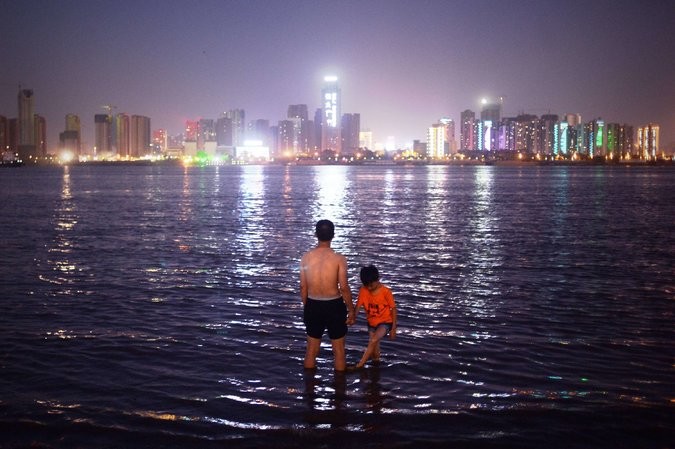
- Reuters reports that China is relying on millions of internal migrants taking up jobs in cities to boost the urban population and consumption. It hopes this will fuel more sustainable long-term economic growth and reduce the country's reliance on big industry and exports that powered the country's rise in the last three decades. But migration is slowing down and workers are more reluctant to travel across the country to find jobs, trends that could undermine these efforts...Government data shows that the number of migrant workers in 2015 reached close to 169 million. But that was up just 0.4 percent from 2014 - the weakest rise since the global financial crisis in 2009. The number of migrants searching for jobs outside of their home province dropped 1.5 percent – the first decline in six years.The government wants 60 percent of its population of almost 1.4 billion to be urban residents by 2020, up from 56.1 percent in 2015.
- When Tsai Ing-wen took office on May 20 as Taiwan's first female president, most observers listened for what she would say about Taiwan's relations with China. Instead, Ms. Tsai focused her inauguration speech on domestic matters, underscoring the new administration's belief that in order to survive and prosper, Taiwan needs above all to focus on the problems it faces at home...In a meeting with foreign delegates the next day, Ms. Tsai stressed the importance of continuing the Trade and Investment Framework Agreement talks with the U.S. She implied that pivoting from a focus on Taiwan's bilateral relationship with China to strengthening multilateral and bilateral ties to the rest of the world would be central to Taiwan becoming a vibrant and sustainable economic powerhouse again, with political values aligned with market democracies...To achieve all these goals, Ms. Tsai has important challenges ahead. Domestically, it will be difficult to restructure a highly regulated economy that has yet to transition from manufacturing to services. Internationally, Taiwan hasn't been able to join international organizations or sign many free trade agreements over Beijing's objections.
China on Monday lashed out at criticism from U.S. Defense Secretary Ashton Carter, accusing him of harboring a Cold War mentality and saying Beijing has no interest in "playing a role in a Hollywood movie" of Washington's design. Foreign Ministry spokeswoman Hua Chunying told reporters Carter's comment last week that China was creating a "Great Wall of self-isolation" was merely an attempt to provide cover for U.S. plans to deploy additional military forces to the Asia-Pacific region. Carter's remarks "laid bare the stereotypical U.S. thinking and U.S. hegemony," Hua said at a daily news briefing. "Indeed, there are some in the U.S. who live physically in the 21st century, but whose minds are stuck in the in the Cold War era," she said. "China has no interest in any form of Cold War, nor are we interested in playing a role in a Hollywood movie written and directed by certain U.S. military officials. However, China has no fear of and will counter any actions that threaten and undermine China's sovereignty and security," Hua said.
- 2016-05-29 China Default Chain Reaction Threatens Products Worth 35% of GDP
- 2016-05-27 G-7 leaders express concern over South China Sea, urge peace
- 2016-05-27 G-7 leaders express concern over South China Sea, urge peace
- 2016-05-26 China warns G7 not to ‘escalate tensions’ in Asia
- 2016-05-25 On the Agenda But Off Guest List, China Eyes G-7 in Japan
- 2016-05-24 Don’t start a fire in Asia, China warns Obama after Vietnam arms embargo lifted
- 2016-05-23 China plans base station for rescue operations in South China Sea
- 2016-05-22 US wields biggest stick in trade dumping fight
- 2016-05-20 Taiwan President Takes Cautious Line on China at Inauguration
- 2016-05-19 China, Denying Close Encounter With American Plane, Points Finger at U.S.
- Bloomberg The Big Short Is Back in Chinese Stocks
- Bloomberg China's HNA to Buy 13% of Virgin Australia, Plans to Lift Stake
- Bloomberg Hong Kong Home Prices Have Much Further to Fall Before Controls Are Eased
- Bloomberg Southeast Asia Is Winning More Japanese Investment Than China
- The Guardian China: US defense secretary Ash Carter living under 'cold war' mentality
- The Washington Post Indonesian navy fires shots, seizes Chinese fishing boat
- Reuters China labour ministry says urban registered unemployment rate was 4.05 pct in 2015
- Reuters REUTERS SUMMIT-Chinese investors eye property, airport and a lead mine in Bulgaria
- Financial Times Dalian Wanda plans to privatise property arm for $4.4bn
- Wall Street Journal China Buying Sparks Bitcoin Surge
- uk.reuters.com China protests to Indonesia over seizure of fishing vessel
- Reuters China's CNPC could consider raising stake in Russia's Rosneft - TV
- in.reuters.com Chinese worker wounded in Pakistani bomb attack
- Reuters China Life, China Taiping interested in $3-billion South Korea life insurer sale: sources
- Bloomberg China's Coal Price Climbs to Eight-Month High Amid Supply Cut
- af.reuters.com China's Jan-April rail freight volume down 7.9 pct y/y
- Financial Times Rich Chinese millennials favour Japan, France for luxury tourism
- Bloomberg When China Sneezes, Those Closest Catch the Worst Colds
- Financial Times Xi Jinping has changed China's winning formula
- nationalinterest.org The South China Sea Crisis: Next Stop the UN Security Council?
- Wall Street Journal The Legacy of Taiwan's Former President Ma Ying-jeou
- Forbes Gauntlet Thrown: Alibaba Plays Pivotal Role In China's Intellectual Property Rights
